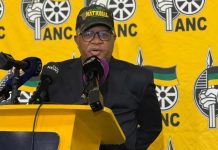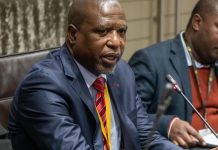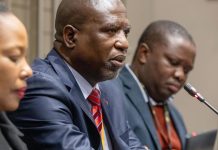Africa-Press – South-Africa. The rand has strengthened back below R19.00/USD on the back of a pause in United States President Donald Trump’s tariff plans and lower tension in the Government of National Unity (GNU).
Investec chief economist Annabel Bishop said it was expected that an improvement in the tariff regime globally would strengthen the rand.
This came after the severe protectionism announced by the United States in early April, which has since been generally lowered.
In addition, and of particular importance for the rand, Bishop said the recent improvement in the relationship between key political parties in the GNU has seen South Africa’s high political risk premium weaken.
These factors combined have strengthened the rand to R18.86/USD.
Bishop said markets have seen some calm recently following last week’s turmoil, and the rand is likely to continue to strengthen to the R18.60/USD mark and then see further strength this quarter.
She explained that, globally, the US dollar’s extreme weakness would normally have pushed up the value of the rand at the cross significantly.
However, the difficulties faced in the GNU last week caused severe market concerns and a collapse in the rand instead.
As the rand is strengthening, the US dollar continues to slide to multiyear lows, causing other currencies such as the euro to also gain against it.
She explained that the negative impact of the trade war on commodities prices has also had a depreciating effect on the rand, as the domestic currency was hit from many sides.
The rand was at R18.12/USD before the impact of the United States’ Liberation Day’ tariffs and the threat to the GNU. It has since stabilised and strengthened as market confidence improved, although not recovered completely.
Meanwhile, concerns over a recession in the United States persist, causing safe haven gains from gold.
GNU troubles
The government’s tensions initially centred around the ANC tabling a national Budget that was not agreed upon by other GNU members in February.
This resulted in the withdrawal of the February Budget, and the ANC had to go back to the drawing board to table a second Budget.
“The inability to compromise over a Budget that works for all political parties saw very severe market volatility,” Bishop explained.
“Key members in the ANC sought the DA’s summary ejection from the GNU, and the ANC overall sought to dictate the coalition’s terms.”
She noted that the GNU’s disagreement seemingly reflects the disproportionate decision-making the ANC is seen to have in the coalition.
This could be seen in recent political polls, with the April poll of the Social Research Foundation (SRF), in particular, finding by a significant margin that the ANC is believed to control everything that matters in the GNU.
The poll found that the ANC dominates government in terms of influence and legislation.
In the 2024 National elections, which led to the formation of the GNU, the ANC received 40% of the vote, nearly double the DA’s 22%.
However, support for the ANC fell to 32% in February this year while the DA rose to 25%, as the historically accurate polls see a loss of confidence in the ANC.
By April, polling has seen national voter support for the ANC drop to 22% without Cyril Ramaphosa as President.
As its support continues to fall, the ANC has now said it is committed to the GNU.
“The challenges that we have faced with the passing of the Budget are matters that are under discussion as we speak,” ANC secretary-general Fikile Mbalula said.
“If it so happens that the impasse is not avoidable in the process of negotiations and talks, it means that will then result in other processes and discussions.”
In addition, Deputy President Mashatile recently said the GNU has had a lot of challenges in the past, but those did not lead to its collapse.
He said it is an agreement of 10 parties – not just the DA and ANC – and they want to ensure that all parties work together to deal with GNU issues.
He added that all 10 parties will prioritise the challenges facing the people of South Africa, “not our narrow political interests”.
For More News And Analysis About South-Africa Follow Africa-Press






